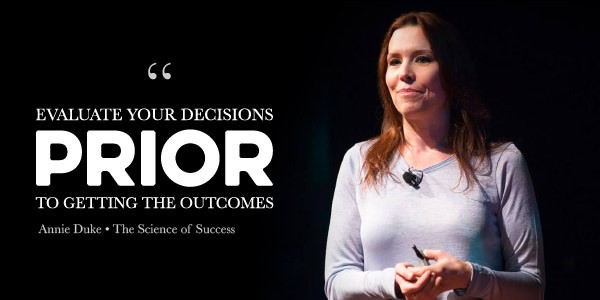In this episode, we discuss how to make better decisions under conditions of uncertainty. We look at “the worst call in the history of football,” discuss examples from life, business and even high stakes poker to understand how to make the best possible decisions in a world filled with unknowns. What exactly is a good decision? Is that different than a good outcome? We look at this key question – and uncover the wisdom hidden in the reality that these two things might be completely different. All this and more with our guest Annie Duke.
Annie is a professional decision strategist and former professional poker player. She has leveraged her expertise in the science of smart decision making throughout her life and for two decades was one of the top poker players in the world. She is the author of the book Thinking In Bets: Making Smart Decisions When You Don’t Have All The Facts and after being granted the National Science Foundation Fellowship, studied Cognitive Psychology at The University of Pennsylvania.
- How do we get create lessons from our experiences?
- How do we sort out the noise in the gap between decision quality and outcome quality?
- In poker (like life) you can make really good decision and have a really bad outcome – but that doesn’t mean that you made a bad decision
- This fuzzy relationship between decision making and outcomes can be very problematic for people
- “Resulting”- tying the quality of the outcome too tightly to the quality of decisions
- “The worst call in the history of all of football” – But what it really?
- An unlucky/bad outcome is not the same as a bad decision
- You get emotionally pulled around in evaluating the quality of your decisions based, usually, on the quality of the outcome
- Red lights and green lights – and how they can shine a light on hidden risks to decision-making
- The only thing that matters is not the result – but the process of making decisions – because that is all we can control
- In our own lives, we constantly lurch into over-reactions when we focus only on results and not on our decision-making quality
- Improving your decision-making accrues across your life through everything you do and harnesses the principle of compounding – a small improvement in decision-making & thinking cascades through everything you do
- Strategy #1: Approach the world through the frame of decisions as bets
- Why you should ask “Wanna Bet?” to get more clarity about a situation
- There are 2 major sources of uncertainty between Decisions and Outcomes
- Luck/Randomness
- Information Asymmetry
- The framework of “wanna bet” creates a hunger for information and a desire to narrow down / reduce uncertainty
- Strategy #2: Get other people involved in the process with you
- You are really good at recognizing other people’s bias, even when you can’t see your own
- When you’re trying to make a decision (or a bet) the person who will win is the person who has the most accurate “mental model” or model of reality
- Its about trying to get the most accurate mental models and get to the truth – not just trying to prove that you’re right
- What we care about is being ACCURATE not being proven RIGHT
- It feels good to be right and it feels bad to be wrong – the key to this shift is to CHANGE what you feel good about – don’t feel good about being right – feel good about moving towards the Truth
- When you ask “how sure am I about this?” You’re rarely 100% or 0% sure about this
- Strategy #3: Try to quarantine yourself from experience
- Escape the quality of the outcome and how it impacts your assessment – unless you have enough data to actually verify it
- Key Steps to Focusing on the Decision-Making Process Not the Outcome
- Evaluate decisions prior to getting the outcome
- Create a Decision Pod of other people who can challenge your thinking
- How do we make better decisions under conditions of uncertainty?
- What does it mean to think in “Expected Value?”
- Most times the future is not 100% to turn out a certain way – there are a variety of outcomes – and each of those outcomes has a probability of occurring and each outcome has an impact
- The key to making effective decisions is to multiply the probability of the outcome by the impact/magnitude
- Being “roughly right” is better than being “precisely wrong”
- Its OK to guess and use rough probabilities when thinking probabilistically – you will still make MUCH better decisions
- Doing the work of improving decision-making creates large positive results and is a self-fulfilling cycle
- The opinions that are most valuable to you are the ones that disagree with you – they can actually teach you something
- Homework #1: find a group of people who are open-minded, who want to be better decision-makers, and agree together that you want to question each others thinking, not be defensive, hold each other accountable to bias
- Homework #2: Start listening to yourself for signals that you might be engaging in biased behavior, using the words wrong/right, should of
- Homework #3: Discuss a decision with 2 different people and give them opposite “outcomes” (Tell one it went really well, tell the other it went really poorly) to get clear sense of different sides of the coin

